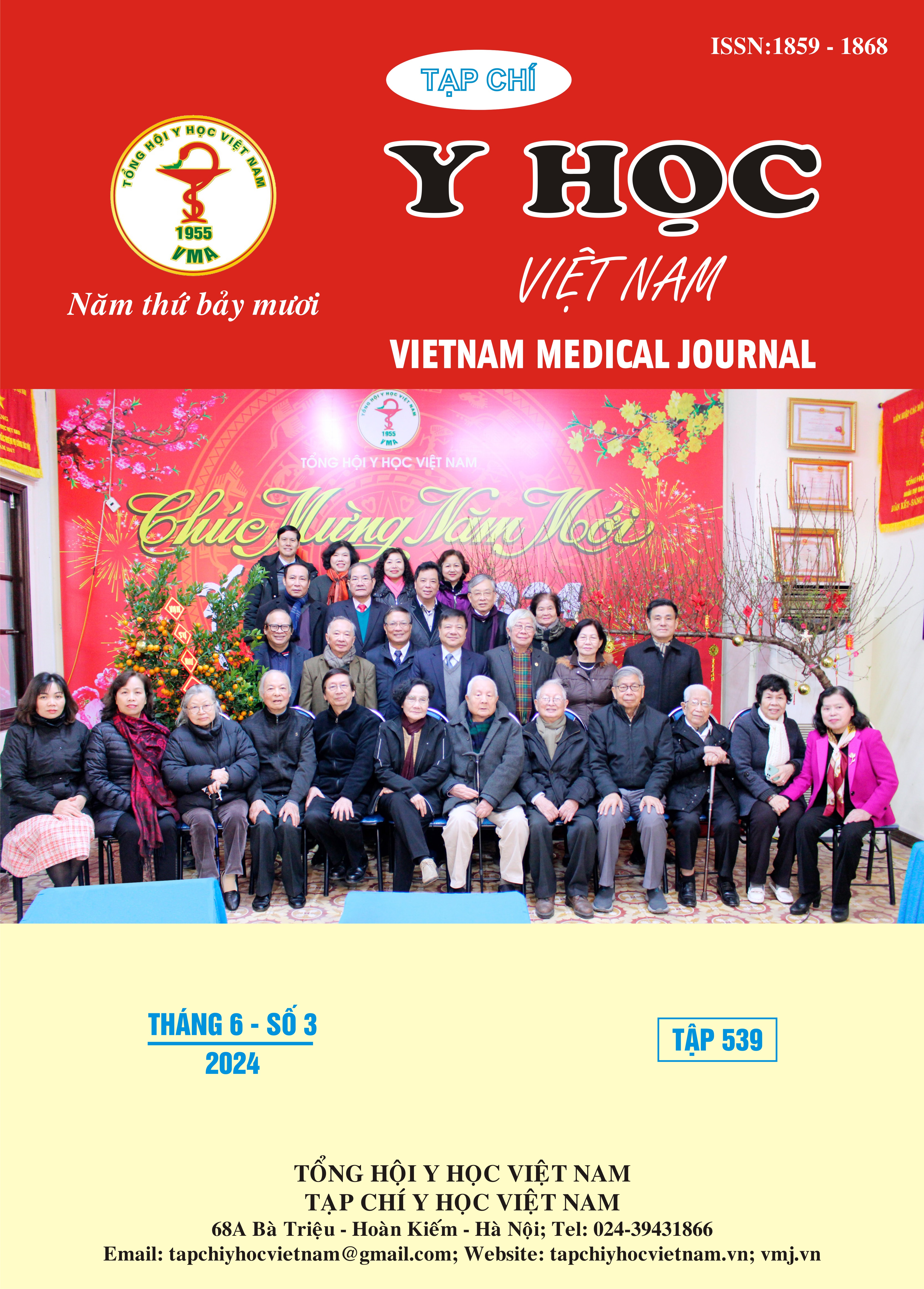EARLY RESULTS OF ANATOMICAL HEPATECTOMY FOR INTRAHEPATIC CHOLANGIOCARCINOMA IN K HOSPITAL
Main Article Content
Abstract
Objective: Curative surgery is recommended as an effective treatment for improving survival time for intrahepatic cholangiocarcinoma. This study was conducted to evaluate the early results of anatomical hepatectomy for intrahepatic cholangiocarcinoma. Materials and methods: A retrospective descriptive study was conducted at the Department of Hepatobiliary and Pancreatic Surgery - K Hospital from January 2021 to December 2023 and consisted of 33 patients undergoing anatomical hepatectomy for ICC-proven by histopathological examination. Results: The mean patient age was 58.8 ± 11.1 years. 18.2% presented chronic hepatitis B and C virus. All patients had normal preoperative liver function (Child A 100%). Right hepatectomy and left hepatectomy concerned 42.4% and 57.6% of cases, respectively. The median postoperative hospital stay was 15.7 ± 12 days. Postoperative complications occurred in 18.1% of patients, including post-hepatectomy liver failure (3.0%), ascites (9.1%), sepsis (3.0%), and pneumonia (3.0%). There was no perioperative mortality. Lymph node metastasis was found in 45.5% of cases. Conclusion: Anatomical hepatectomy with lymph node dissection is a safe and effective procedure for ICC with low postoperative complication rates.
Article Details
Keywords
intrahepatic cholangiocarcinoma, surgery, anatomical hepatectomy
References
2. Liver Cancer Study Group of Japan. The general rules for the clinical and pathological study of primary liver cancer. 2nd English ed. Tokyo JKC, Ltd., ed., 2003.
3. Ikai I, Arii S, Okazaki M, et al. Report of the 17th nationwide follow-up survey of primary liver cancer in Japan. Hepatol Res. 2007;37:676–91.
4. Morimoto Y, Tanaka Y, Ito T, et al. Long-term survival and prognostic factors in the surgical treatment for intrahepatic cholangiocarcinoma. J Hepatobiliary Pancreat Surg. 2003;10:432-440.
5. Luo X, Yuan L, Wang Y, et al. Survival Outcomes and Prognostic Factors of Surgical Therapy for All Potentially Resectable Intrahepatic Cholangiocarcinoma: A Large Single-Center Cohort Study. J Gastrointest Surg 2014;18:562-72.
6. Jutric Z, Johnston WC, Hoen HM, et al. Impact of lymph node status in patients with intrahepatic cholangiocarcinoma treated by major hepatectomy: a review of the National Cancer Database. HPB (Oxford). 2016;18:79-87.
7. Kim JM, Cho BI, Kwon CHD, et al. Hepatectomy is a reasonable option for older patients with hepatocellular carcinoma. The American Journal of Surgery. 2015;209(2),391-397.
8. Đạt TQ. Nghiên cứu đặc điểm lâm sàng, cận lâm sàng và kết quả phẫu thuật cắt gan do ung thư đường mật trong gan. Luận văn bác sĩ nội trú Đại học Y Hà Nội. 2010.
9. Shimada K, Sano T, Nara S, et al. Therapeutic value of lymph node dissection during hepatectomy in patients with intrahepatic cholangiocellular carcinoma with negative lymph node involvement. Surgery. 2009;145:411–6.
10. Addeo P, Jedidi I, Locicero A, et al. Prognostic impact of tumor multinodularity in intrahepatic cholangiocarcinoma. 2019;23,1801-1809.


